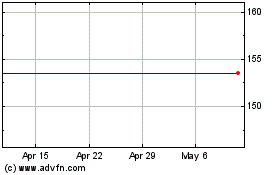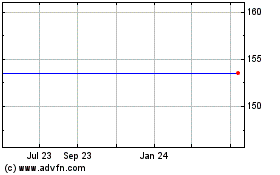By Christopher M. Matthews and Amy Harder
The linchpin of a corporate tax overhaul proposed by House
Republicans would mark a massive change for the U.S. oil-and-gas
industry and has companies frantically studying whether to support
it, fight it or stay on the sidelines.
The proposal, a border-adjustment tax, would remove companies'
ability to deduct import costs, including on raw materials, as
regular business expenses. In turn, exports and other foreign sales
wouldn't count as income, meaning the U.S. would stop taxing
companies' foreign revenue and profits.
Such a system could benefit companies that export fuel products
or sell domestic crude, because it would make imported crude more
expensive. It could hurt those companies that must import crude
from other countries.
The proposal faces an uphill challenge on Capitol Hill, where it
has encountered strong opposition from some major companies,
including retailers and conglomerate Koch Industries. Many senators
are also opposed. But President Donald Trump spoke positively about
the proposal in an interview with Reuters Thursday, saying "I
certainly support a form of tax on the border." The White House had
previously sent mixed signals on the issue.
For now, energy companies are taking it seriously. Rep. Kevin
Brady (R., Texas), chairman of the House Ways and Means Committee
and an architect of the proposal, met last week with company tax
executives at the headquarters of the American Petroleum
Institute.
"Coming from an energy state, I thought our meeting was very
productive, " Mr. Brady said.
The API and the American Fuel and Petrochemical Manufacturers
have both concluded in internal reports that a border adjustment
would raise gasoline prices by 20 cents a gallon or more in the
short term, according to people familiar with the matter.
Supporters of the border adjustment have said it would have
corresponding currency impacts that would ultimately leave fuel
prices relatively unchanged.
The groups haven't made their findings public and haven't taken
a stance on the proposal because of splits among their membership,
the people said. The API represents many domestic drillers that
could be helped by the program, while the AFPM tends to represent
refiners, some of whom could end up paying more for imports.
"AFPM supports comprehensive tax reform, but refiners are
concerned that a border-adjusted tax could have considerable
impacts on the industry, consumers and the economy," AFPM President
and CEO Chet Thompson said in a statement.
Even within the industry there are splits. Refiners on the east
or west coast that rely heavily on imported crude, such as Tesoro
Corp. and PBF Energy Inc., are opposed to the plan, people familiar
with the matter said. Refiners with better access to U.S. crude and
the ability to export fuel products from the Gulf Coast, such as
Texas-based Valero Energy Corp., are more neutral to the idea.
Valero, Tesoro and PBF declined to comment.
Some independent drillers such as Devon Energy Corp. have
indicated the proposal could be beneficial, believing the proposal
would likely lead to increased prices for U.S. crude oil.
"We do see where it could be a positive overall for our
portfolio," Devon Chief Executive David Hager said last week. The
company said in a statement Thursday that it hasn't formally
endorsed the proposal, which it still considers conceptual, but
supports broader tax reform.
Continental Resources Inc., a producer headed by oil man Harold
Hamm, who served as an adviser to President Donald Trump, a
Republican, during his campaign, has yet to take a position on the
proposal or the broader tax package, said Blu Hulsey, the company's
vice president of government and regulatory affairs.
"It's an incomplete puzzle," he said. "We're going to reserve
judgment."
Retail gasoline sellers, including the Society of Independent
Gasoline Marketers of America trade group, have come out against
the proposal. But most energy companies and trade groups have kept
their positions quiet, commissioning internal studies on its
effects and lobbying behind the scenes.
A Koch Industries study concluded that if U.S. drillers sold to
domestic refiners at current prices, about $53 a barrel, they would
pass on a roughly $10 premium to compensate for the 20% levy they
would be paying for not exporting the oil. Refiners would be forced
to buy that marked-up domestic crude to avoid their own 20% levy on
imported crude.
Conversely, Goldman Sachs concluded the border adjustment would
be a boon for drillers, leading to a 25% appreciation of U.S. crude
and product prices and an extra $20 billion in cash flow from
higher domestic crude price and increased production.
Several studies have concluded that U.S. gasoline purchasers
would take a hit: Barclays PLC said in an analyst note in January
the tax could cost a family an additional $400 a year in gasoline
costs as refiners pushed increased costs onto consumers.
"[It's] really is going to increase domestic crude prices at the
benefit of domestic producers, to the detriment of the consumer,"
Marathon Petroleum Corp. Chief Executive Gary Heminger said in the
company's earnings call earlier this month.
--Erin Ailworth contributed to this article.
Write to Christopher M. Matthews at christopher.matthews@wsj.com
and Amy Harder at amy.harder@wsj.com
(END) Dow Jones Newswires
February 23, 2017 19:14 ET (00:14 GMT)
Copyright (c) 2017 Dow Jones & Company, Inc.
Andeavor (NYSE:ANDV)
Historical Stock Chart
From Mar 2024 to Apr 2024

Andeavor (NYSE:ANDV)
Historical Stock Chart
From Apr 2023 to Apr 2024
